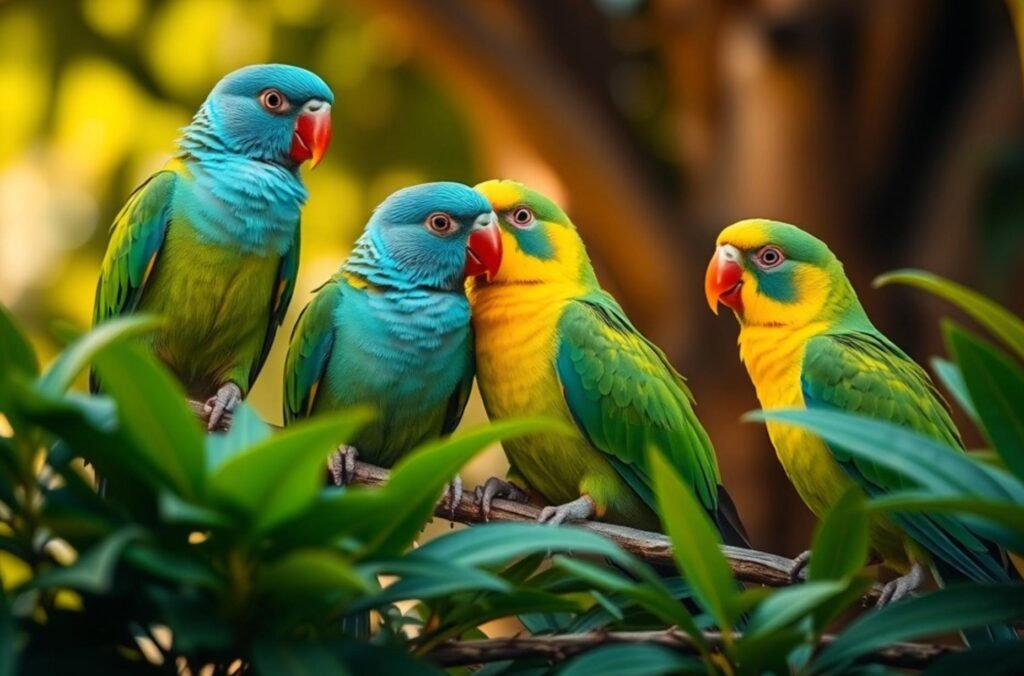Parakeets are beloved pets known for their vibrant colors, playful personalities, and ability to mimic sounds. But as a pet owner or someone considering adopting a parakeet, one common question arises: how long can they live? Understanding the lifespan of parakeets and the factors that influence it is essential for providing them with the best care possible. This guide dives into the factors that impact their longevity and actionable tips to ensure your feathered friend lives a healthy, happy life.
Factors Affecting Parakeet Lifespan
Species and Breed
Parakeets come in different breeds, each with varying lifespans. The most common type kept as pets is the budgerigar (budgie), which typically lives 5 to 10 years. Larger parakeets, like Indian Ringnecks or Alexandrine parakeets, may live much longer, often reaching 15–25 years. When adopting a parakeet, it’s important to research the specific species to understand their unique needs and expected lifespan.
Diet and Nutrition
A parakeet’s diet plays a crucial role in its health and longevity. Feeding them a well-balanced diet consisting of high-quality seeds, pellets, and fresh fruits and vegetables provides essential nutrients. Foods rich in vitamins A, C, and E are especially beneficial for maintaining their immune system. Avoid giving them harmful foods such as chocolate, avocado, caffeine, or alcohol, which can be toxic to birds.
Tips for Optimal Nutrition:
- Include leafy greens like spinach or kale.
- Offer fruits such as apples or berries (without seeds).
- Supplement their diet occasionally with calcium-rich cuttlebones.

Living Conditions
A clean and spacious cage enhances a parakeet’s quality of life. Crowded or unhygienic living conditions can lead to stress and illness. Ensure their cage is large enough for movement and flight within the space, with proper ventilation.
Key Cage Requirements:
- Minimum dimensions: 18 x 18 x 24 inches for one budgie.
- Provide perches, swings, and toys to keep them entertained.
- Clean the cage regularly to prevent infections.
Exercise and Mobility
Parakeets are active birds that need regular exercise to stay healthy. Allowing them out-of-cage flight time ensures they maintain physical fitness and reduces the risk of obesity-related issues. Lack of exercise can lead to muscle weakness and shortened lifespans.
Actionable Steps:
- Let your parakeet fly in a safe, enclosed area daily.
- Place toys in their cage to stimulate movement.
- Encourage interactive play sessions with you.
Veterinary Care
Routine veterinary visits are essential for detecting early signs of illness. Parakeets may not show symptoms until a disease has progressed, making regular check-ups critical. Common health concerns include respiratory infections, digestive issues, and mites.
How to Find a Specialist Vet:
- Look for an avian veterinarian with experience treating birds.
- Schedule annual wellness exams even if your parakeet appears healthy.
- Monitor for unusual behaviors like lethargy or changes in appetite.
Social Interaction
Parakeets are highly social creatures that thrive on interaction with their owners or other birds. Loneliness or neglect can lead to depression, stress, and even physical health complications. If you’re unable to spend enough time with your parakeet daily, consider adopting another bird as a companion.
Ways to Promote Social Engagement:
- Talk to your parakeet often; they enjoy mimicking sounds.
- Spend at least 30 minutes daily interacting with them.
- Introduce a second bird cautiously to ensure compatibility.
Genetics
Just like humans, genetics can play a role in a parakeet’s overall health and lifespan. Some birds may inherit predispositions to illnesses or conditions that could shorten their lives. Unfortunately, this factor is beyond your control, but providing excellent care may mitigate some risks.
Stress Management
Stress can significantly impact a parakeet’s lifespan. Sudden changes in environment, loud noises, improper handling, or exposure to extreme temperatures can cause anxiety. Reducing stress helps ensure they stay healthy long-term.
Stress Reduction Tips:
- Maintain consistent routines for feeding and interaction.
- Avoid placing their cage near loud TVs or speakers.
- Keep them away from drafts or direct sunlight.
FAQs About Parakeet Lifespan
How long do parakeets typically live in captivity?
Parakeets generally live between 5–15 years in captivity when provided with proper care. Larger species or those with superior genetics may live longer.
What should I feed my parakeet to extend its lifespan?
A diverse diet including seeds, pellets, fresh vegetables (e.g., carrots, broccoli), fruits (e.g., apples, pears), and occasional supplements like cuttlebones can enhance their health.
Are parakeets prone to any specific health issues?
Common health problems include respiratory infections, mites, feather plucking due to stress, and digestive issues. Regular vet visits help detect these early.
Do parakeets need companionship?
Yes. Parakeets are social birds that benefit from interaction with owners or other birds. Lack of socialization can lead to loneliness and stress-related illnesses.
How can I tell if my parakeet is stressed or sick?
Signs of stress or illness include changes in appetite, lethargy, unusual vocalizations, ruffled feathers, or discharge around the eyes/beak.
Conclusion
Parakeets are delightful pets that can bring joy for many years when cared for properly. Their lifespan depends on factors such as diet, living conditions, exercise, and social interaction. By addressing these areas thoughtfully and consistently, you can help your parakeet live a long and fulfilling life. Start implementing these tips today and create a nurturing environment for your feathered companion.
